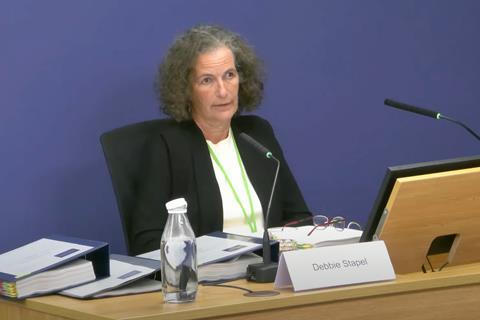A lawyer who worked on prosecutions of Post Office workers has said it ‘defies belief’ that information was held back from her which might have prevented miscarriages of justice.
Debbie Stapel, a barrister formerly in the Post Office’s criminal law team, told the public inquiry yesterday that evidence was ‘concealed’ by senior figures before cases went to trial.
‘I think it’s unbelievable that, even at the rollout stage, people were aware that there were technical issues and they were kept hidden. I just think it’s outrageous, the suffering that’s been caused by that,’ said Stapel.
‘I feel that I thought I was advising fairly and competently, and I wasn’t, in the [Post Office] cases, and I think it’s quite devastating.’
Stapel insisted she had no knowledge of any bugs or errors with the Horizon IT system which formed the sole basis for prosecuting Post Office employees for more than a decade. This system has since been discredited and many of the hundreds of convictions quashed.

The inquiry was shown a document from 2010 – with prosecutions still ongoing – showing the notes of a meeting between managers from the Post Office and Fujitsu, the designers of Horizon. The meeting had heard discussions about a bug in the system and its potential impact.
The notes discussed whether the bug could cause a loss or gain to appear on the accounts of an individual branch, and that if widely known this could ‘cause a loss of confidence in the Horizon system’. This in turn could have an impact on legal cases where branches were disputing the integrity of Horizon and ‘could provide branches ammunition to blame Horizon for future discrepancies’.
Stapel said the information about a bug would be ‘dynamite’ but stressed that nobody from legal services was involved in what appeared to be a cover-up.
She added: ‘It’s just extraordinary that any problem with Horizon will be kept from any sub-postmaster or any branch, and the suggestion it might have a potential impact on ongoing legal cases suggests that the people who are involved in this knew that the information should have been relayed both to the criminal law team and civil, and it would look as if this was being hidden.
‘Clearly, the whole basis on which the Post Office operated was that the accounting system could be relied on. It’s just extraordinary and it makes one wonder how many other meetings with similar problems took place over how many years. But this is clearly something that should have been disclosed to both the criminal law team and, indeed, the defence.’
Stapel said she was not aware it was possible to amend the branch accounts remotely, recalling that her bosses in the criminal law team indicated this was ‘set in stone’.
She said knowledge that this was possible should have relayed to all branches, but instead this was ‘another sad example of how things were concealed’.
Stapel said she regretted that she had not independently checked that experts used in the prosecution case were appropriately checked. She added there was ‘clearly a conflict’ in Gareth Jenkins, an employee of Fujitsu, acting as an expert witness in court.
Stapel conceded that audits of branch accounts were more like a ‘stocktake’ and a ‘snapshot’ that showed what should be present. She said the evidence in the prosecution of Carl Page would have been presented differently if she had known of errors with Horizon and added it was ‘horrendous’ that the sub-postmaster faced a trial on flawed evidence.






























